Here's what it's actually like to play The Day Before, the zombie survival game whose developer folded days after it launched
The open world survival game is no longer available for sale, but its servers are still up. So how bad is it?
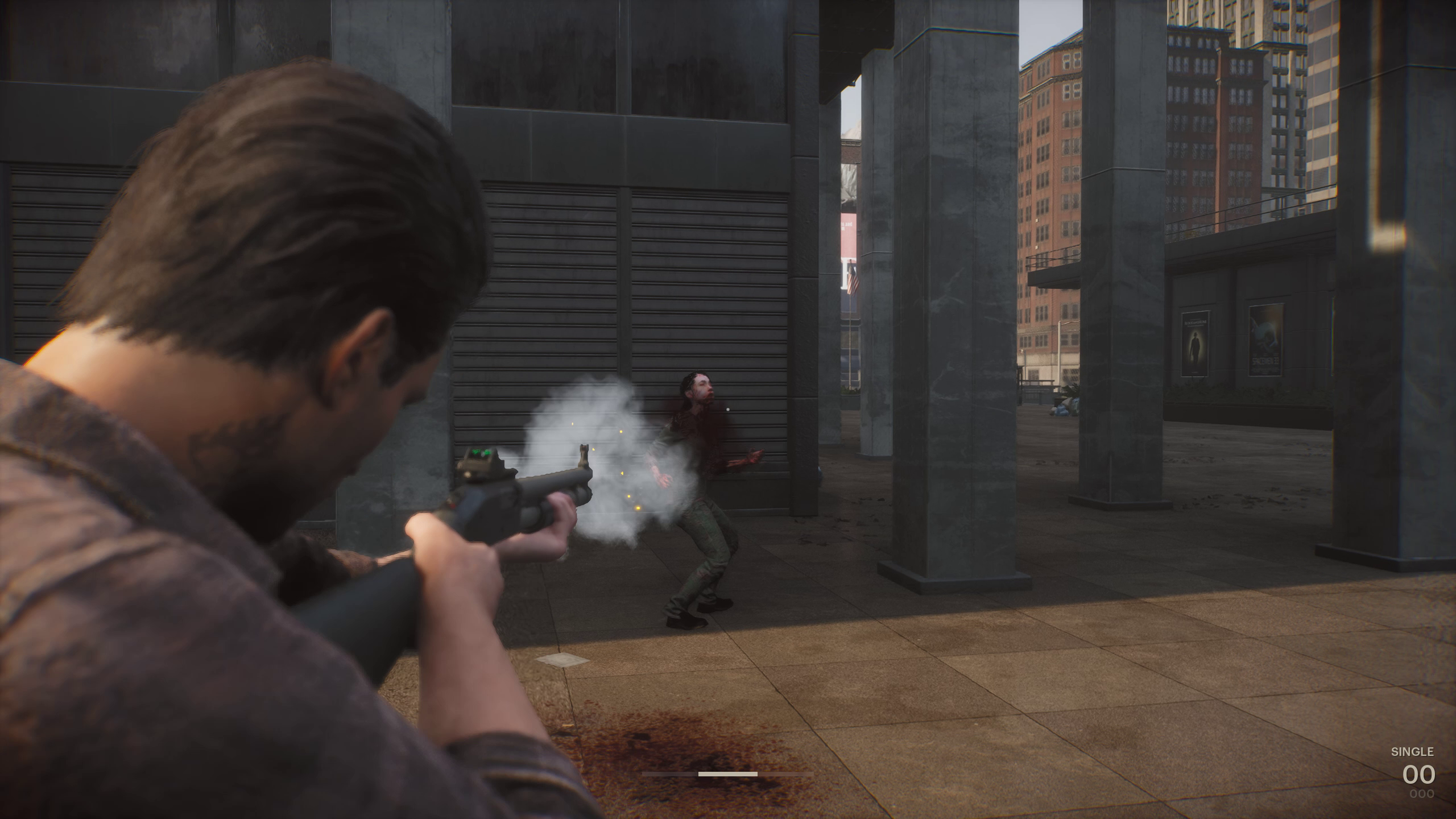
The Day Before was one of the most-wishlisted games on Steam before it came out in early access last week. Players flooded into the servers—over 38,000 were playing concurrently at its peak—but very quickly began flowing out, either because they were unable to connect to the servers, which featured no login queues, struggled with crashes and bugs, or just weren't having fun in the open-world survival game. Just four days and many refunds later, developer Fntastic announced that it was closing, and The Day Before joined the ranks of legendary videogame flops.
But is The Day Before really that bad? We've played it and, yeah, it's pretty bad—not shockingly so, but certainly not a game to stake a company on.
How expectations for The Day Before got so high in the first place is a bit of a sociological mystery. Taken at face value and with the understanding that they're clearly choreographed, the 2021 announcement and gameplay trailers that earned The Day Before so much hype look fairly similar to the game that released. They include features absent in the early access release, such as vaulting, but basically show what you get: abandoned stores to loot, awkward third-person shooting, and zombies that run directly at you.
Later gameplay videos were more representative of the early access game: We called a now-deleted gameplay video from early this year "very dull," and indeed, the game is very dull.
But the 4K sheen in the trailers and the developer's weirdly bombastic communication style—here's the whole history of that—seemingly led some to expect something more like multiplayer The Last of Us, despite there being no way this relatively small developer was going to accomplish that.
In the end, The Day Before is a buggy outline of an open-world extraction shooter. You can no longer buy it on Steam, but the servers are still online for now. For the morbidly curious, here's what 2023's most dramatic flop is like to play.
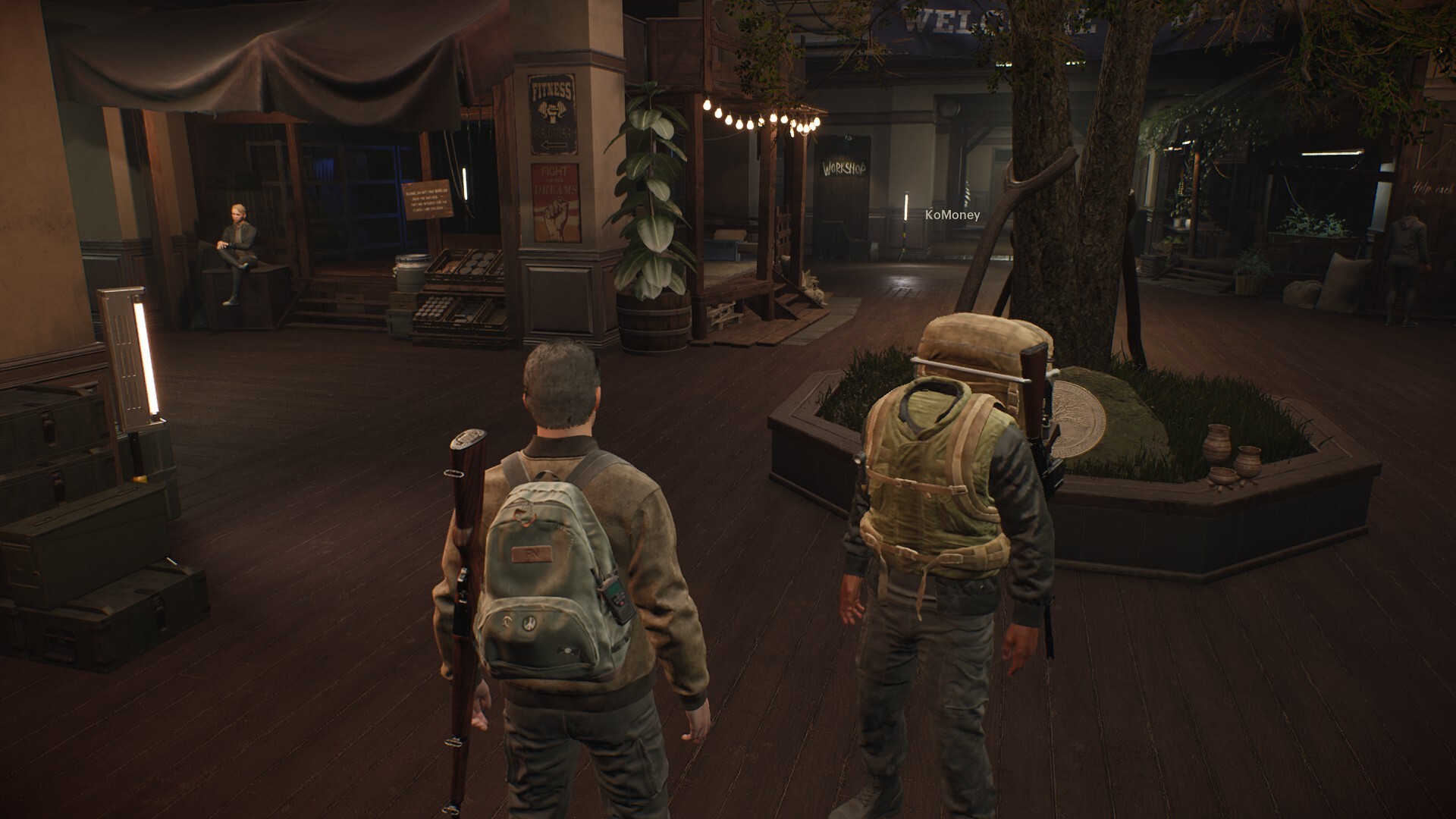
Woodberry, with an 'e'
It took me two hours of manual reconnecting to get into the game and conquer the short tutorial, after which I took to the streets of New Fortune City for the first time. For about five minutes, anyways. Around the time I was crossing the street to rummage through my second trash bin I crashed to desktop, which cost me another hour and a half before I was reconnected. Logging back in, I was still on the street in New Fortune City, but the tutorial mission I’d already finished had bugged out, blocking me from using my weapons or even transferring items in my inventory. I did eventually manage to extract alive from my predicament, and that would be the most exciting my time with The Day Before would get.
Keep up to date with the most important stories and the best deals, as picked by the PC Gamer team.
As the overwhelmingly negative Steam reviews were quick to point out, The Day Before is not really an open world MMO by most people's definitions. New Fortune City is a big map, but the game is an extraction shooter similar to Escape From Tarkov with more than a little inspiration from more PVE-focused games like The Division.
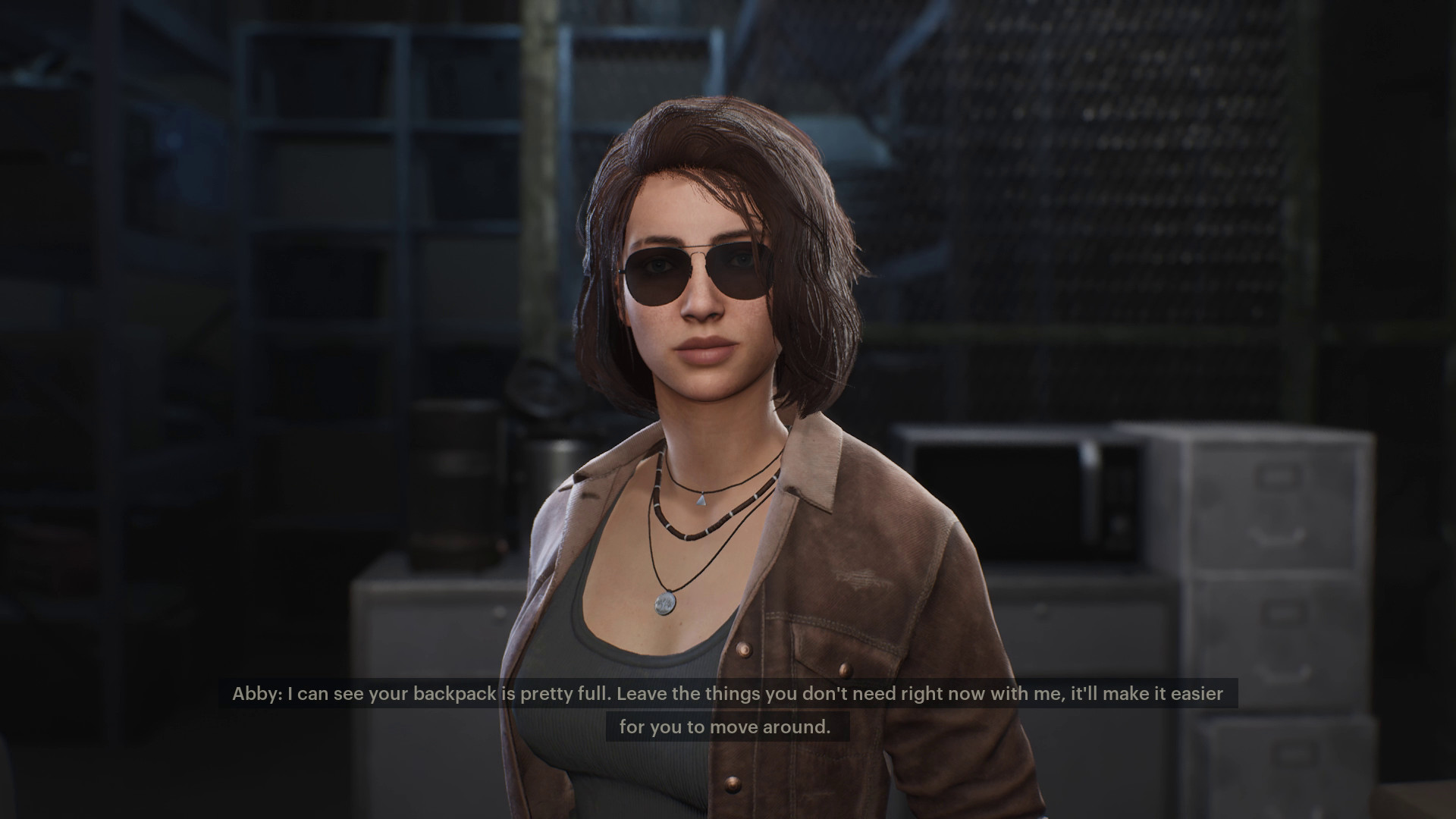
Accepting that, its attempt to establish an interesting world for players to live and scavenge in is a total bust. From the moment you wake up in the suspiciously named survivor camp of Woodberry, you're introduced to the incredibly bland cast of The Day Before, which is essentially a leader figure, three vendors, and a person who manages your storage. The only thing these paper-thin NPCs like more than repeating their six vaguely optimistic voice lines is sending you randomly generated quests, asking you to collect three cartons of mysteriously unexpired milk or five USB chargers on your next journey into New Fortune City. It's a shallow routine, with little rhyme or reason to where you can acquire the right items, or why you would even bother fetching them. There's very little sense of progression in The Day Before—meta or otherwise—with your character or their base of operations.
As another example of that shallowness, during the tutorial I'm taken to my very own plot of land outside of Woodberry and guided through putting up a tent, a folding cot, and a few other simple amenities with a simple interface for buying and placing structures and furniture. This part of the game feels like a prototype for something more meaningful—like running your own settlement or even building or acquiring meta-upgrades—but as it is, it isn't clear why I'd want to build a ranch house in the wilderness, other than the intrinsic joy of home ownership, I suppose.
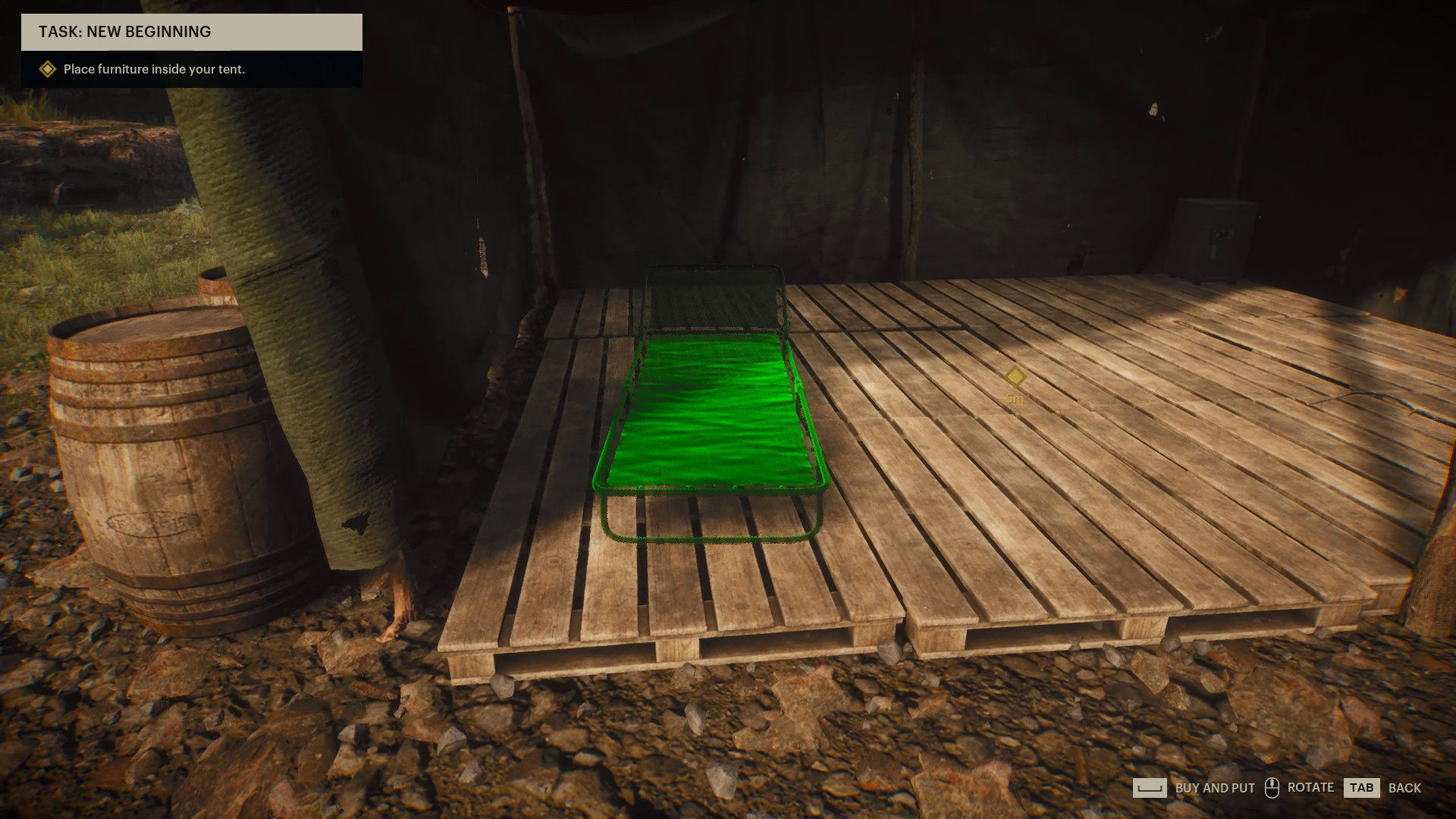
Any zombies here?
When I finally made it into New Fortune City again, an abandoned New York-like city with parody business names like "Chasm" in place of Chase bank, I crept through downtown streets in search of things to scavenge. I'd been sent on a quest to acquire important supplies for one of the leaders of the small community of Woodberry, and whatever else I could scrounge up. The longer I stayed, the greater the risk I'd be shot down by other scavengers or gored by undead humans only referred to as "the infected".
So, uh, where were they? My first proper journey into New Fortune City was 20 minutes of wandering the streets, encountering no players and exactly one zombie, stuck in a car and running in place.
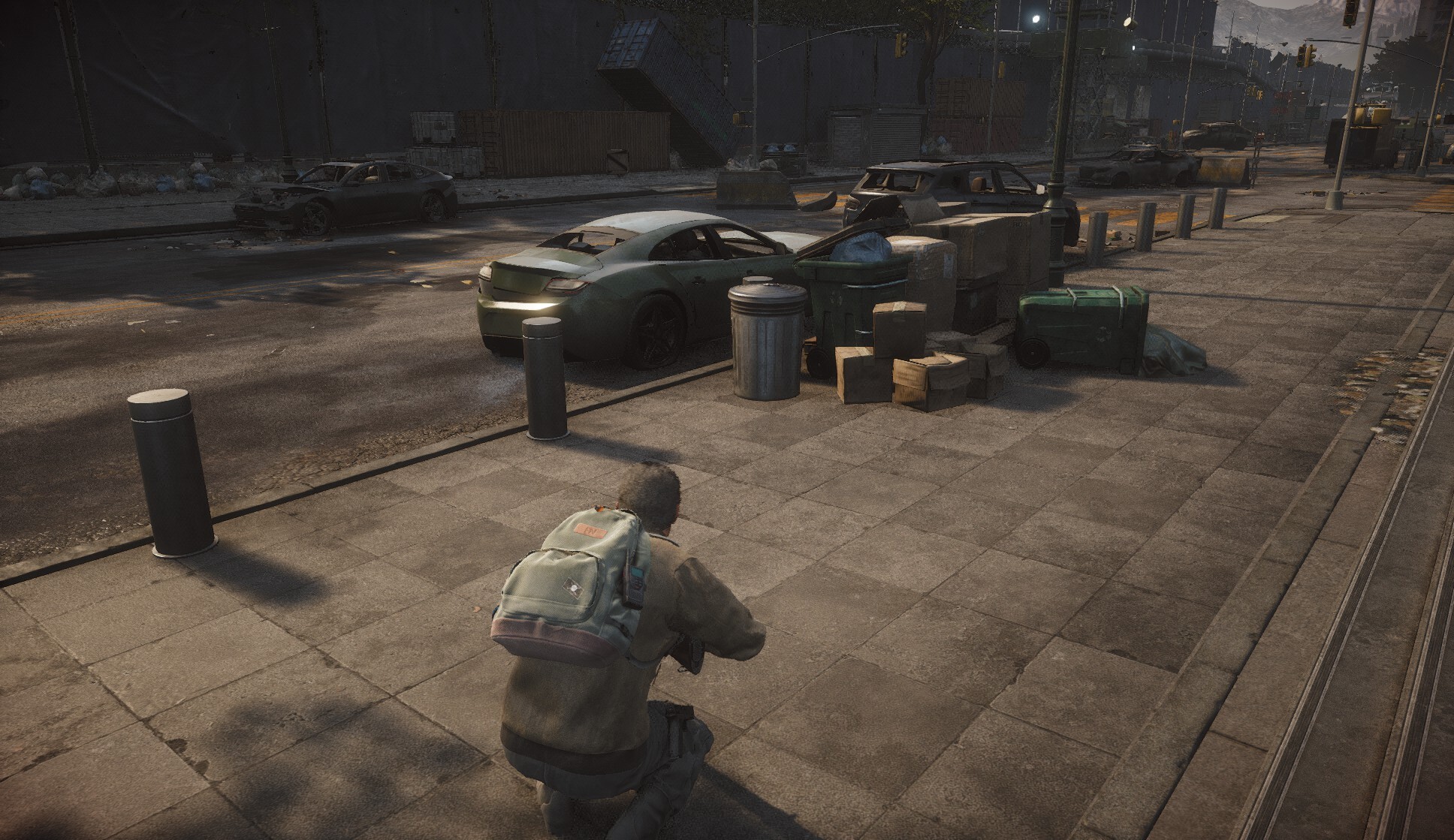
The infected enemies were rare enough that I sometimes forgot they were part of the game at all. When I did encounter The Day Before's zombies, they would either run straight towards me, or they were already stuck on random cars or piles of rubble, unable to free themselves or do more than gibber with annoyance as I wandered past them. The one time I was threatened by the infected was when I learned by running out of ammo that there is no melee option whatsoever in The Day Before, a feature that felt so obvious I simply assumed it was present. Missing or underdeveloped features like this just kept piling up for me, including a jump that seemed incapable of actually jumping onto or over nearly anything.
Another example: Figuring out which containers are lootable means walking to everything and rubbing up against it in search of the sweet spot that will let me press F. Often I left not knowing if I'd just given up on a lootable container or if it wasn't one designed for me to interact with. The majority of my runs I just looted vehicles, since they are consistently lootable through their doors, but I never once found a vehicle containing more than one item, and I spent a lot of my time watching progress bars that would reveal yet another bottle of perfume or discarded fork that I didn't want.
Another player at PC Gamer got into a couple firefights with other players, which all happened at a good distance. Lag caused their attacker to jump between positions, which made it challenging to land shots with the awkward-to-aim guns. The people who took shots at me were hiding too well to be seen, but the presence of armed hostile players did generate some of that extraction shooter tension: the constant wondering whether or not someone is watching me, and if I'll be able to slip through an area undetected and extract. But that tension drains quickly if I've got no reason to invest in my potential gains and losses. What do I care if my digital loot is under threat when it's not leading to anything I really care about?
Before Fntastic's sudden closure, a small contingent suggested it might be possible for the studio to build the game into a halfway decent extraction shooter with time. That was probably wishful thinking. It's not known how long The Day Before's servers will stay up, but you aren't missing anything: spend your time playing Hunt: Showdown instead if you want to see horror masterfully mixed into your extraction shooter.

Sarah is a contributor for PC Gamer, formerly of TechRadar Gaming. With five years of experience writing freelance for several publications, she's covered every genre imaginable and probably a few she made up. She has a passion for diversity and the way different genres can be sandboxes for creativity and emergent storytelling, and loves worldbuilding. With thousands of hours in League of Legends, Overwatch, Minecraft, and countless survival, strategy, roguelike, and RPG entries, she still finds time for offline hobbies like tabletop RPGs, wargaming, miniatures painting, and hockey.
- Tyler WildeEditor-in-Chief, US

